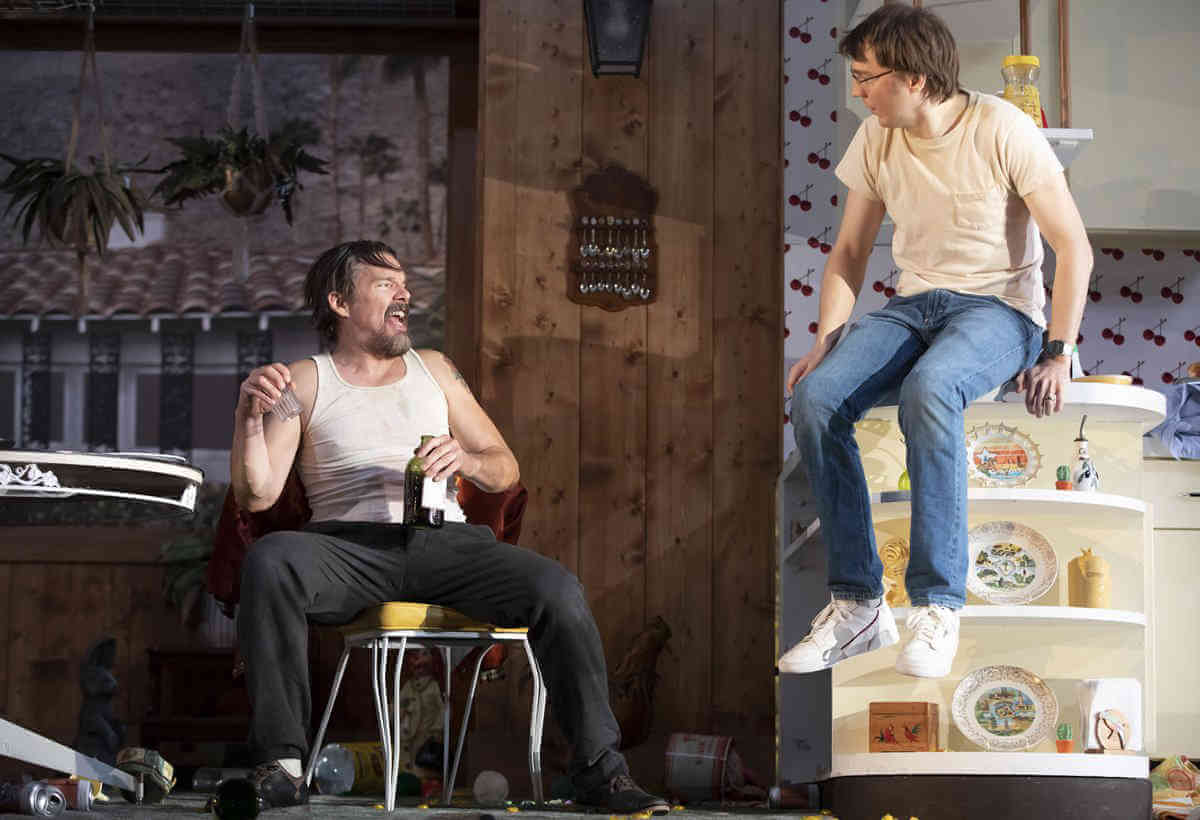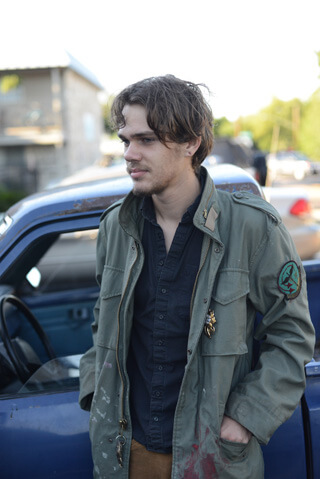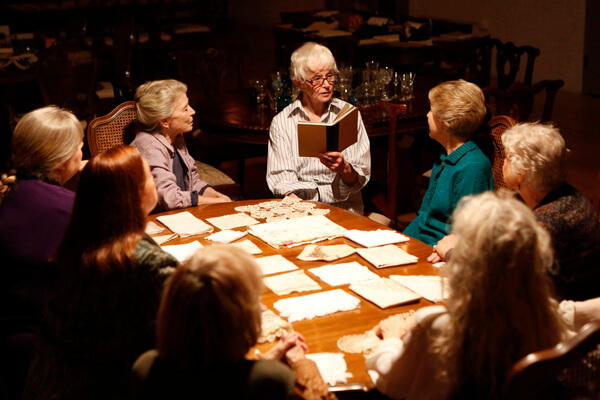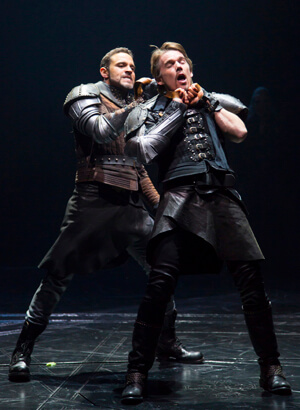Masculinity, power, dominance, and testosterone-jacked battles are at the heart of all Sam Shepard’s family plays, and although “True West,” now getting an edge-of-the-seat exciting revival at Roundabout, first appeared in 1980, it has never seemed more culturally relevant.
Throbbing under this classic tale of family dysfunction and sibling rivalry is the question of what it means to be male in our culture. The internalized, romantic myths of masculinity in the American West, more a feature of fiction than history, are at odds with the realities of professional men, married with families in modern life as it’s actually lived. In today’s world, the classic Western hero — rugged, independent, answering to no one — could be branded as “toxic.” Yet, the responsible man who cares for his family and has stability can be portrayed as weak. Even the current language of politics adheres to these tropes — and resonates with a public who wants, if only vicariously, to feel powerful and in control.
In the tale of two brothers, Shepard is deconstructing the myths we build our lives around. Cannily, in offering no resolution, Shepard also suggests that this is a uniquely post-modern conflict that will leave males caught between their natures and a world for which they are in many ways ill-equipped. Given how big these issues are, the plot is deceptively simple. Austin is a successful screenwriter housesitting in his mother’s home while she’s in Alaska. Lee, his n’er-do-well brother, arrives. Lee makes his living by stealing and imagines himself an individualist hero. Austin gives him space and loans him his car, evidently the alpha because of his material wealth. When Lee pitches a story to Austin’s producer and the producer bites, the tables are turned, touching off a battle between the siblings that exposes their vulnerabilities. Lee can’t write a screenplay, and Austin can’t find the peace and freedom of the desert that Lee says he’s found. They are essentially two sides of the American male psyche, so conflict and attempted mutual destruction are inevitable — and impossibly fraught.
Director James Macdonald’s production is gripping and threatening, delving into the dark conflicts at the heart of the script at the same time finding a core of irony. It’s a lot lighter and funnier than previous productions I’ve seen, and its inherently satirical tone works well in 2019. The violence, however harrowing, is manically comic, rendering the characters ridiculous, grown men reduced to their childhood battles. That’s a good part of what makes this production seem so contemporary.
Ethan Hawke as Lee and Paul Dano as Austin are both extraordinary in their roles. Hawke is both powerful physically and fearful and Dano is more passive yet manipulative, the more cerebral fighter. The two are well matched in terms of focus and intensity and brilliantly underscore the inherent absurdity of their battles for ephemeral identities. Gary Wilmes as the producer who wants Lee’s conventional Western story over Austin’s romcom is perfectly understated, as is Marylouise Burke as the mother who walks back into the devastation. Part of the deliciously mordant ending is how both Lee and Austin revert to their childhood behaviors when faced with their displeased mother. It’s just one more dig at American mythology that make this such a rich, enthralling, and dynamic evening.
The Transport Group’s compelling revival of Daniel Berrigan’s 1970 play “The Trial of the Catonsville Nine” is political theater at its best. The story of the arrest and trial of the activists, including Berrigan and his brother Philip, both of them Catholic priests, has been reimagined to be performed by three actors moving around desks littered with photographs and documents from the Vietnam War. They’re a stark reminder of the violence and horror of that time, and the audience is invited to look through them before taking seats on the sides.
The play details the trial of the activists who removed draft records from the Catonsville, Maryland, selective service office and burned them in the parking lot with homemade napalm. They never denied what they did and were willing to go to jail, which they did, to make the point about the meaningless death of young men in Vietnam. The legal theory of the defense was that the draft was immoral and that as Roman Catholics they were calling out the religious bureaucracies as racist accomplices in the war. They were convicted for conspiracy and destruction of government property. It is ultimately a morality play that asks the audience to examine not only the actions of its government, but our own personal responsibility in opposing injustice.
Berrigan’s original play has been adapted and directed by Jack Cummings III, artistic director of Transport Group. He has added some information but left a good deal of Berrigan’s poetic lyricism intact. Performed by three actors — David Huynh, Mia Katigbak and Eunice Wong, all outstanding — with them and the audience all on the stage of the Abrons Art Center, the play takes on an intimacy and humanity that are tension-filled and chilling. The actors each play many characters, and Cummings has orchestrated the switching among them so elegantly that the piece takes on a powerful theatricality juxtaposing the passion of the activists against the government’s hard line. The result is not polemical, as often is the case with political theater, but visceral. “The Trial,” produced in partnership with the National Asian American Theatre Company, is a call for us to examine our moral standing in the face of something simply unacceptable.

The two August Strindberg plays now in repertory at CSC are about as exciting as theater gets — not something often said about the playwright’s work. However, “Mies Julie,” the original “Miss Julie” transplanted to South Africa in an adaptation by Yaël Farber, and “The Dance of Death,” in a new version by Conor McPherson, are so vibrant as to seem newly minted.
“Mies Julie” tackles issues of sex, race, and class. Julie, the white daughter of a wealthy landowner, has a night of passion with John, a black laborer on the farm where she’s grown up. Her childish romanticism becomes her undoing as her willful denial of the realities of her world lead to tragedy for all involved. As directed by Shariffa Ali, the play is filled with risk and danger and is consistently exciting. Elise Kibler as the naïve and selfish Julie is brilliant. James Udom as John inhabits the role with an intensity that is electrifying in the small space at CSC.
“The Dance of Death” is a grim look at a marital relationship that has gone on for 25 years, with Edgar and Alice, trapped together on a remote island military base, having at each other. When Kurt, an old friend arrives, the hostilities escalate, and cataclysm threatens… until a kind of ceasefire happens. They are trapped in an ugly and bitter life forever, but somehow the power game is exactly what they want.
The play prefigures Albee and even Beckett in its bleak presentation of a terrible marriage and how people get trapped in lives they hate. Perhaps surprisingly, the play is often hysterically funny. McPherson’s adaptation and the sharp-eyed direction of Victoria Clark make the production trenchant satire, bordering on the absurd. Staged in the round, the play is a battle royale that is engaging and amusing. It is decidedly not your usual happily-ever-after.
TRUE WEST | Roundabout Theatre Company at the American Airlines Theatre, 227 W. 42nd St. | Through Mar. 17: Tue.-Sat 7 at p.m.; Wed., Sat. at 2 p.m.; Sun. at 3 p.m. (some evening performances at 8 p.m. rather than 7 p.m.) | $59-$169 at roundabouttheatre.org or 212-719-1300 | Two hrs., with intermission
THE TRIAL OF THE CATONSVILLE NINE | Transport Group at Abrons Arts Center, 466 Grand St. at Pitt St. | Through Feb. 23: Tue.-Sat. at 7:30 p.m.; Sun. at 3 p.m. | $60 at transportgroup.org or 866-811-4111 | Ninety mins., no intermission
MIES JULIE AND THE DANCE OF DEATH | CSC, 136 E. 13th St. | Through Mar. 10: schedule varies | $82-$127 (for both plays, ticket pair begins at $99) at classicstage.org or 212-677-4210 |”Mies Julie”: One hr., 15 mins., no intermission; “Dance of Death”: One hr., 50 mins., no intermission



































